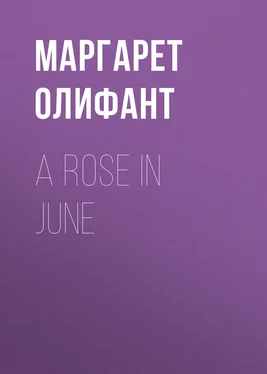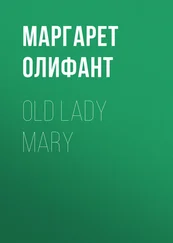Маргарет Олифант - A Rose in June
Здесь есть возможность читать онлайн «Маргарет Олифант - A Rose in June» — ознакомительный отрывок электронной книги совершенно бесплатно, а после прочтения отрывка купить полную версию. В некоторых случаях можно слушать аудио, скачать через торрент в формате fb2 и присутствует краткое содержание. Жанр: foreign_prose, literature_19, foreign_antique, на английском языке. Описание произведения, (предисловие) а так же отзывы посетителей доступны на портале библиотеки ЛибКат.
- Название:A Rose in June
- Автор:
- Жанр:
- Год:неизвестен
- ISBN:нет данных
- Рейтинг книги:4 / 5. Голосов: 1
-
Избранное:Добавить в избранное
- Отзывы:
-
Ваша оценка:
- 80
- 1
- 2
- 3
- 4
- 5
A Rose in June: краткое содержание, описание и аннотация
Предлагаем к чтению аннотацию, описание, краткое содержание или предисловие (зависит от того, что написал сам автор книги «A Rose in June»). Если вы не нашли необходимую информацию о книге — напишите в комментариях, мы постараемся отыскать её.
A Rose in June — читать онлайн ознакомительный отрывок
Ниже представлен текст книги, разбитый по страницам. Система сохранения места последней прочитанной страницы, позволяет с удобством читать онлайн бесплатно книгу «A Rose in June», без необходимости каждый раз заново искать на чём Вы остановились. Поставьте закладку, и сможете в любой момент перейти на страницу, на которой закончили чтение.
Интервал:
Закладка:
She would sit by him for hours together, like a charming piece of still-life, when he pleased, and was ready to converse or to listen, to walk, to sing, to follow his lead in everything, as only a woman-child, full of the beautiful enthusiasm of youthful admiration, can do. Nothing except perhaps the devotion of a young wife, when she really loves the man much older than herself, whom she has married, can equal the devotion of a girl to her father. She admired everything about him—his beautiful refined head, his fine voice, his grace and high breeding, his sermons, and what she called his genius. To find this faultless father to be anything less than a demi-god was terrible to Rose. I do not mean to say that she got within a hundred miles of this discovery all at once; nay, the first result of the vague and dreamy doubts that stole into her mind was rather an increase of enthusiasm for her father, an instinctive making-up to her own ideal for the sense of failure in him, of which she was vaguely conscious. Rose loved her mother after a totally different fashion, in an ordinary and matter-of-fact way, but she had no romance of feeling towards her; and when her whole little world, began, as it were, to sway upon its axis, to yield beneath her feet, as if it might swing round altogether in space, turning what she had supposed the brighter side into shadow, and elevating that which she had held lowly enough, she, poor girl, grew giddy with this strange and sickening sensation. She was at the age, too, when everything is apt to reel about the young experimentalist taking her first steps in life. She was vaguely conscious of being now a free agent, consulted as to her own movements, no longer told curtly to do this and that, but exercising personal choice as to what she should do. This change is of itself sufficiently bewildering. Nature makes, as it were, a pause at this first crisis of personal life. The child, wondering, half-delighted and half-troubled to have no longer its duties clearly and sharply indicated, falls into a partial trance, and neglects many things for sheer want of use and knowledge how to act for itself.
This was Rose’s position. Between the mother, who, a little mortified and hurt at her child’s want of sympathy with her, did not give her orders, but only suggested employment, and the father, who said, “Never mind, let her alone,” she stood, not knowing how to settle the question, but inclining naturally to the side on which she was most indulged and smiled upon, though with a secret uneasiness which she could not shake off, and moral sense of a false situation which grew upon her day by day.
Rose had lovers, too, in this new, miraculous life upon which she had entered: two lovers, not yet declared, but very evident to all knowing eyes; and in the village there were many keen observers. One of these suitors was the most wealthy proprietor, in the neighborhood—a man much above her own age, yet not old, and perfectly qualified to please a lady’s eye; and the other, a young naval lieutenant without a penny, the son of Mrs. Wodehouse, who lived on the Green, and had nothing in the world but her pension as an officer’s widow. Of course I do not need to say that it was the poor man whom Rose preferred. She was not in love with him—far from it; but she was so completely on the verge of universal awakening, that a word or touch might be enough to arouse her whole being at any moment—might open her eyes to her own position and that of her parents, and show her the nature of her individual sentiments, as by a sudden gleam of light. Rose, however, was not the least in the world aware of this; and at the present moment she was no further advanced than was consistent with saying frankly that she liked Wodehouse very much—and feeling (but of this she said nothing) more glad when she saw him coming than about any other event in her simple days.
Dinglefield is a sociable place, and there is something in a soft summer evening after a very hot, blazing summer day which fosters a disposition to stroll about and interchange greetings with your neighbors. As it began to darken upon the evening of this particular day, various people in the houses about stepped out of their wide-open windows after dinner, and, tempted by the beauty of twilight, strayed along the road or over the Green to the rectory garden, which was by universal acknowledgment “the most perfect spot” in the village. Much has been said about the charms of twilight, but little, I think, of its peculiar English beauty, which is not so magical as the momentary interval between light and dark in the south, or the lingering, prolonged, silvery, and ineffable dimness of those northern twilights which last half the night; but has a dusky softness altogether peculiar to itself, like the shadowing of downy wings. The air was delicious, fresh after the hot day, yet so warm as to make wrappings quite unnecessary. The sky, still somewhat pale in its blue after the languor of the heat, looked down faint yet friendly, as if glad to see again a little movement and sense of life. A few subdued stars peeped out here and there, and the wide stretch of country lay dim underneath, revealing itself in long soft lines of gray, till it struck into a higher tone of blue on the horizon where earth and heaven met. All the Damerels who were out of bed were in the garden, and the neighbors, who had made this pleasant terrace the end of their walk, were scattered about in various groups. Mr. Incledon, who was Rose’s wealthy lover, came late and stood talking with Mrs. Damerel, watching with wistful eyes her appropriation by his rival, young Wodehouse—whose mother, hooded in the white Shetland shawl, which she had thrown over her cap to come out, sat on a garden-chair with her feet upon the rector’s Persian rug, listening to him while he talked, with the devout admiration which became a member of his flock. The rector was talking politics with General Peronnet, and Mrs. Wodehouse thought it was beautiful to see how thoroughly he understood a subject which was so much out of his way as the abolition of purchase in the army. “If he had been in parliament now!” she said to the general’s wife, who thought her husband was the object of the eulogy. There were two or three other members of this group listening to the rector’s brilliant talk, saying a few words, wise or foolish, as occasion served. Others were walking about upon the lawn, and one lady, with her dress lifted, was hastening off the grass which she had just discovered to be wet with dew. Upon none of them, however, did Mr. Incledon’s attention turn. He followed with his eyes a pair whose young figures grew less and less in the distance, half lost in the darkness. The persistence with which he watched them seemed a reproach to the mother, with whom he talked by fits and starts, and whose anxiety was not at all awakened by the fact that Rose was almost out of sight. “I am afraid Rose is not so careful as she ought to be about the dew on the grass,” she said, half apologetically, half smiling, in reply to his look.
“Shall I go and tell her you think so?” said Mr. Incledon, hastily. He was a man of about five-and-thirty, good looking, sensible, and well dispositioned; a personage thoroughly comme il faut . He was the sort of suitor whom proper parents love to see approaching a favorite child. He could give his wife everything a woman could desire—provide for her handsomely, surround her with luxury, fill her life with pleasures and prettinesses, and give her an excellent position. And the man himself was free of cranks and crotchets, full of good sense, well educated, good tempered. Where are girls’ eyes, that they do not perceive such advantages? Mrs. Damerel hesitated a moment between sympathy with her child and sympathy with this admirable man. There was a struggle in her mind which was to have the predominance. At length some gleam of recollection or association struck her, and moved the balance in Rose’s favor, who she felt sure did not want Mr. Incledon just at that moment.
Читать дальшеИнтервал:
Закладка:
Похожие книги на «A Rose in June»
Представляем Вашему вниманию похожие книги на «A Rose in June» списком для выбора. Мы отобрали схожую по названию и смыслу литературу в надежде предоставить читателям больше вариантов отыскать новые, интересные, ещё непрочитанные произведения.
Обсуждение, отзывы о книге «A Rose in June» и просто собственные мнения читателей. Оставьте ваши комментарии, напишите, что Вы думаете о произведении, его смысле или главных героях. Укажите что конкретно понравилось, а что нет, и почему Вы так считаете.












